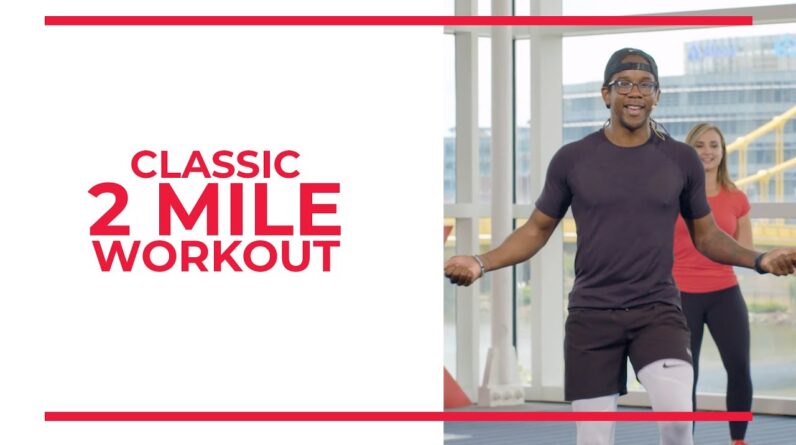
Exercise intensity: How to measure it
Get the most from your workouts by knowing how to gauge your exercise intensity.
When you exercise, are you working hard or hardly working? Exercising at the correct intensity can help you get the most out of your physical activity. You can make sure you’re not pushing too hard or too little. Here’s a look at what exercise intensity means, and how to make best use of your workout.
Choosing your exercise intensity
How hard should you be exercising? For most healthy adults, the Department of Health and Human Services recommends these exercise guidelines:
-
Aerobic activity. Get at least 150 minutes of moderate aerobic activity a week. Or get at least 75 minutes of vigorous aerobic activity a week. You also can get an equal combination of moderate and vigorous activity. Aim to spread out this exercise over a few days or more in a week.
For even more health benefits, the guidelines suggest getting 300 minutes a week or more of moderate aerobic activity. Exercising this much may help with weight loss or keeping off lost weight. But even small amounts of physical activity can be helpful. Being active for short periods of time during the day can add up and have health benefits.
Moderate aerobic exercise includes activities such as brisk walking, biking, swimming or mowing the lawn. Vigorous aerobic exercise includes activities such as running, swimming laps, heavy yard work or aerobic dancing.
-
Strength training. Do strength training for all major muscle groups at least two times a week. One set of each exercise is enough for health and fitness benefits. Use a weight or resistance level heavy enough to tire your muscles after about 12 to 15 repetitions.
Strength training can include use of free weights, weight machines or resistance tubing. And it can include activities that use your own body weight, such as rock climbing or heavy gardening. Or try squats, planks or lunges.
Your exercise intensity must generally be at a moderate or vigorous level for the most benefit. For weight loss, the more intense or longer your activity, the more calories you burn.
Exercise progression is important, but this should be at a gradual rate. Overdoing it can raise your risk of soreness, injury and burnout. Start at a light intensity if you’re new to exercising. Slowly build up to a moderate or vigorous intensity. As a general guide, aim for about a 10% increase in the amount of your activity per week for a safe progression.
Think about the reasons you exercise. Do you want to improve your fitness, lose weight, train for a competition or do a combination of these? Your answer will help decide the right level of exercise intensity for you.
Be realistic and don’t push yourself too hard too fast. Fitness is a lifetime commitment, not a sprint to a finish line. Talk to a health care professional if you have any medical conditions or you’re not sure how hard you should exercise.
Understanding exercise intensity
Activity tracker
Activity tracker
![]()
Activity tracker
An activity tracker can be used to count steps, find out distance traveled and monitor other fitness information.
When you’re doing aerobic activity, such as walking or biking, exercise intensity has to do with how hard the activity feels to you. Exercise intensity also can be seen in your breathing and heart rate, whether you’re sweating, and how tired your muscles feel.
You can measure exercise intensity in two basic ways:
-
How you feel. Exercise intensity is a subjective measure of how hard physical activity feels to you while you’re doing it, called your perceived exertion. Your perceived exertion may be different from what someone else feels doing the same exercise. For example, what feels to you like a hard run can feel like an easy workout to someone who’s more fit.
Perceived exertion may not always be similar to your heart rate level, and it depends on the person. But perceived exertion can be a general guide to measure your exertion level. If you think you’re working hard, your heart rate is probably higher than usual.
- Your heart rate. Your heart rate offers a more fact-based look at exercise intensity. In general, the higher the heart rate during physical activity, the higher the exercise intensity.
You can use either way of gauging exercise intensity. If you like technology, you can check your heart rate with an activity tracker that includes a heart rate monitor. If you feel you’re in tune with your body and your perceived exertion, you’ll likely do fine without a monitor.
Gauging intensity by how you feel
Here are some clues to help you judge your exercise intensity.
Moderate exercise intensity
Moderate activity feels somewhat hard. Here are clues that your exercise intensity is at a moderate level:
- Your breathing quickens, but you’re not out of breath.
- You start to lightly sweat after about 10 minutes of activity.
- You can talk to someone, but you can’t sing.
Vigorous exercise intensity
Vigorous activity feels challenging. Here are clues that your exercise intensity is at a vigorous level:
- Your breathing is deep and rapid.
- You start to sweat after only a few minutes of activity.
- You can’t say more than a few words without pausing for breath.
Overexerting yourself
Beware of pushing yourself too hard too often. If you are short of breath, are in pain or can’t work out as long as you’d planned, your exercise intensity is probably higher than your fitness level allows. Back off a bit and gradually build intensity.
Mayo Clinic Minute: How to hit your target heart rate
Regular exercise can make your heart stronger and more efficient.
“Well, we want that target heart rate range. And that means we’re working hard enough that our heart is getting beneficial activity and beneficial exercise.”
Dr. Ed Laskowski, co-director of Mayo Clinic Sports Medicine, says you should get about 30 minutes of moderate activity at least five days a week.
“And moderate is something that you’re — you’re breathing kind of hard, but you can still hold a conversation.”
That should get your heart rate up to the target range, and studies show that the level of exertion we feel correlates quite well with our heart rate.
“We’re getting good blood flow. We’re training our heart muscle to work more efficiently, and … actually strengthening it. So if we … don’t do that — if we’re doing something too light — we won’t get as much of the beneficial effect.”
Dr. Laskowski says the actual numbers aren’t as important as the effects.
“As long as we feel we’re working moderately hard and … we’re getting some good activity, we’re doing good things for ourself.”
For the Mayo Clinic News Network, I’m Ian Roth.
Gauging intensity using your heart rate
Another way to gauge your exercise intensity is to see how fast your heart is beating on average during physical activity. To use this method, you first have to figure out your maximum heart rate. The maximum heart rate is the upper limit of what your heart and blood vessel system, called the cardiovascular system, can handle during physical activity.
If you’re healthy, you can figure out your approximate maximum heart rate by multiplying your age by 0.7 and subtracting the total from 208. For example, if you’re 45 years old, multiply 45 by 0.7 to get 31.5, and subtract 31.5 from 208 to get a maximum heart rate of 176.5. This is the average maximum number of times the heart should beat each minute during exercise in this example.
Once you know your maximum heart rate, you can find out your desired target heart rate zone. The target heart rate zone is the level at which you’re exercising and conditioning the heart but not overworking it.
The American Heart Association generally recommends these heart rate targets:
- Moderate exercise intensity: 50% to about 70% of your maximum heart rate.
- Vigorous exercise intensity: 70% to about 85% of your maximum heart rate.
If you’re not fit or you’re just beginning an exercise program, aim for the lower end of your target heart rate zone. Then, slowly build up the intensity. If you’re healthy and want to exercise at a vigorous intensity, opt for the higher end of the zone.
How to find your target heart rate zone
Use an online calculator to find your desired target heart rate zone.
Or follow this example to get an estimate of your target heart rate zone using the heart rate reserve (HRR) method. If you’re aiming for a target heart rate in the vigorous exercise range of 70% to 85%, you can use the HRR method to calculate it like this:
- Multiply your age by 0.7 and subtract the total from 208 to get your maximum heart rate.
- Calculate your resting heart rate by counting how many times your heart beats each minute when you are at rest, such as first thing in the morning. It’s usually somewhere between 60 and 100 beats per minute for the average adult.
- Calculate your heart rate reserve (HRR) by subtracting your resting heart rate from your maximum heart rate.
- Multiply your HRR by 0.7 (70%). Add your resting heart rate to this number.
- Multiply your HRR by 0.85 (85%). Add your resting heart rate to this number.
- These two numbers are your target heart rate zone for vigorous exercise intensity when using HRR to calculate your target heart rate zone. Your heart rate during vigorous exercise should generally be between these two numbers.
For example, say your age is 45 and you want to figure out your target heart rate zone for vigorous exercise using the HRR method. Follow these steps:
- First, multiply 45 by 0.7 and subtract the total from 208 to get your maximum heart rate. The maximum heart rate is 176.5.
- Next, check your resting heart rate first thing in the morning. Say it’s 80 beats per minute. Calculate your HRR by subtracting 80 from 176.5. Your HRR is 96.5.
- Multiply 96.5 by 0.7 (70%) to get 67.5, then add your resting heart rate of 80 to get 147.5. This is your target heart rate at 70% intensity.
- Now multiply 96.5 by 0.85 (85%) to get 82, then add your resting heart rate of 80 to get 162.03. This is your target heart rate at 85% intensity.
- Your target heart rate zone for vigorous exercise is 148 to 162 beats per minute, rounded to whole numbers.
How to tell if you’re in the zone
So how do you know if you’re in your target heart rate zone?
Use an activity tracker to check your heart rate regularly while you exercise.
Or use these steps to check your heart rate during exercise:
- Stop briefly.
- Take your pulse for 15 seconds. To check your pulse at the blood vessel in the neck called the carotid artery, place your index and third fingers on your neck to the side of your windpipe. To check your pulse at your wrist, place two fingers between the bone and the tendon over the blood vessel found on the thumb side of the wrist, called the radial artery.
- Multiply this number by 4 to find out your beats per minute.
Here’s an example: You stop exercising and take your pulse for 15 seconds, getting 37 beats. Multiply 37 by 4, to get 148. If you’re 45 years old, this puts you in the target heart rate zone for vigorous exercise, since the target zone for that age is between 148 and 162 beats per minute using the HRR method. If you’re under or over your target heart rate zone, raise or lessen your exercise intensity.
Target heart rate tips
It’s important to note that maximum heart rate is only a general guide. You may have a higher or lower maximum heart rate, sometimes by as much as 15 to 20 beats per minute. And other factors such as your physical activity routines, fitness level and health can all affect your target heart rate range. If you want a more specific range, talk about your target heart rate zone with an exercise physiologist or a personal trainer.
Generally, only elite athletes may need to get a very specific range. They also may use slightly different ways to figure out the target heart rate that may lead to differences in the target heart rate range. These differences are so small that most casual athletes don’t need such specific ranges.
Also note that many types of medicines, including some medicines to lower blood pressure, can lower your maximum heart rate, and then lower your target heart rate zone. Ask a member of your care team if you need to use a lower target heart rate zone because of any of your medicines or medical conditions.
Research also shows that interval training, which includes short bouts (around 20 seconds to 4 minutes) of higher intensity exercise between periods of longer, less strenuous exercise throughout a workout, is well tolerated. It’s even safe for those with heart disease and type 2 diabetes. This type of training also is very effective at increasing heart and blood vessel, also called cardiovascular, fitness and helping with weight loss.
Reap the rewards of exercise intensity
You’ll get the most from your workouts if you’re training at the proper exercise intensity for your health and fitness goals. If you don’t feel like you’re working out hard enough or your heart rate is too low, pick up the pace. If you’re worried that you’re pushing yourself too hard or your heart rate is too high, back off a bit.
Before starting a vigorous exercise program, you may want to talk with a member of your health care team, who may suggest that you have certain tests first. This may be the case for people who have diabetes or more than one risk factor for heart disease, and for men over age 45 and women over age 55.
From Mayo Clinic to your inbox
Sign up for free and stay up to date on research advancements, health tips, current health topics, and expertise on managing health. Click here for an email preview.
To provide you with the most relevant and helpful information, and understand which information is beneficial, we may combine your email and website usage information with other information we have about you. If you are a Mayo Clinic patient, this could include protected health information. If we combine this information with your protected health information, we will treat all of that information as protected health information and will only use or disclose that information as set forth in our notice of privacy practices. You may opt-out of email communications at any time by clicking on the unsubscribe link in the e-mail.
Thank you for subscribing!
You’ll soon start receiving the latest Mayo Clinic health information you requested in your inbox.
Sorry something went wrong with your subscription
Please, try again in a couple of minutes
Aug. 25, 2023
- Physical Activity Guidelines for Americans. 2nd ed. U.S. Department of Health and Human Services. https://health.gov/paguidelines/second-edition. Accessed March 7, 2023.
- Know your target heart rates for exercise, losing weight and health. American Heart Association. https://www.heart.org/en/healthy-living/fitness/fitness-basics/target-heart-rates. Accessed March 7, 2023.
- AskMayoExpert. Physical activity (adult). Mayo Foundation for Medical Education and Research; 2022.
- Franklin BA, et al. Exercise prescription and guidance for adults. https://www.uptodate.com/contents/search. Accessed March 8, 2023.
- Riebe D, et al., eds. ACSM’s Guidelines for Exercise Testing and Prescription. 11th ed. Kindle edition. Wolters Kluwer; 2022. Accessed March 8, 2023.
- Bushman BA, et al., eds. ACSM’s Resources for the Exercise Physiologist. 3rd ed. Kindle edition. Wolters Kluwer; 2022. Accessed March 8, 2023.
- Laskowski ER (expert opinion). Mayo Clinic. May 22, 2023.
Products and Services
.








